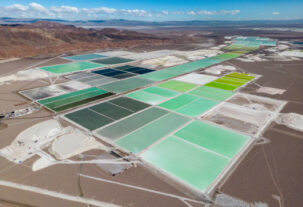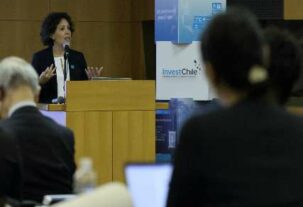
Essential information

Al Gore recognizes Chile as global example of solar energy development

The entry of foreign capital has facilitated the development and diversification of Chile’s energy matrix, particularly as regards the use of non-conventional renewable energies (NCRE). InvestChile understands that many companies are eager to reduce their carbon emissions – a field in which green energies play a crucial role – in order to produce more cleanly and with less impact on the environment.
Among other ambitious goals which Chile has set itself, it aims to be producing at least 70% of its electricity from NCRE by 2050, positioning itself as one of the three OECD countries with the lowest average power prices.
During the presentation of his second documentary about the urgency of action on climate change, the former vice-president of the United States, Al Gore, drew attention to Chile as the country where the solar energy sector has shown the fastest growth.
“Chile is inspiring the world with a significant expansion of solar energy [which has grown] more quickly than in any other country in the planet. Florida could imitate this progress at the same speed, which would mean not only lower electricity bills but also job creation,” he said. (The complete article here)
The speed with which Chile has developed its solar potential is reflected in the generation of over 850 MW from solar panels in 2015, up from 11 MW in 2013. At present, solar projects represent 1,800 MW in installed capacity.
The Quilapilún Solar Park, located 40 kilometers from Santiago, recently connected to the grid. With an installed capacity of 110 MWp, it expects to produce 243 GWh annually, equivalent to the consumption of 110,000 households. (For further information about this project, click here).
Chile sets a trend
Referring to Al Gore’s comments, Chile’s Environment Minister Marcelo Mena told the La Tercera newspaper that they reflect Chile’s approach of fostering the development of renewable energies without subsidies and at lower economic costs in defiance of those who deny climate change and argue that energy of this type is expensive and bad for economic growth.
Mena added that “Chile’s example [shows that] it is possible to achieve sustainable development which, at the same time, ensures more competitive and cheaper energy.”
Claudio Seebach, executive vice-president of the Generators of Chile industry association, told the Emol online newspaper that he is in “complete agreement” with Mena’s remarks.
Chile is “one of the countries with the world’s best solar conditions and we have the highest solar radiation. But that does not suffice. We also have a very competitive electricity generation market that is, therefore, very open to foreign investment, innovation and the possibility of developing the sector,” said Seebach. (For the complete article, click here).
The challenge for the local industry is to advance in the development of technology and produce, for example, solar panels or lithium batteries in Chile. Faced with this need, which is also an opportunity, the country has launched a Lithium Tender in order to develop a value-added industry using this non-metallic mineral in, for example, the production of cathodes for the lithium batteries that are essential for the storage of solar and wind energy.
More than a dozen companies from around the world participated in this tender and seven companies from China, Russia, South Korea, Belgium and Chile have gone forward to the next stage of the process. (For further details, see here).
Work is also underway to promote the development of a “Solar District” in the Diego de Almagro area of the Atacama Region.







